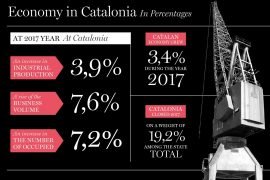[dropcap letter=”W”]
ith the arrival of giants like Netflix or Amazon Prime, audiovisual production is not just experiencing a gold-rush in fiction, but is also opening up massive opportunities for documentaries, converted into series by episodes, ridding themselves of the straitjacket of two-hour movies and considering much more ambitious goals.
So far, this golden age of the documentary has given us gems like Wild Wild Country—the crazy portrait of the Rajneesh sect and their attempt to build a utopian city in the middle of the Oregon desert—and also promises to revolutionize sports documentaries with projects like All or Nothing, the Amazon franchise that had to date made immersive portraits of rugby and American football teams, and which in 2018 has gone in to the world of soccer with an immersive portrait of Manchester City FC.
For a figure quoted by some media at around £10 million, last season City let Mediapro’s cameras stick to the team like glue, with virtually unlimited access to training, the stars, and Pep Guardiola’s pep talks in the locker room. “They followed us into the showers and everything,” one of the captains commented, laughing. In the world of journalism, this style is known as fly-on-the-wall, and goes back to historical reports such as the 1950 portrait of Ernest Hemingway by Lillian Ross in the New Yorker magazine. And now the possibilities are endless, especially when access by cameras to previously inaccessible places is allowed.
 The result of All or Nothing: Manchester City is a never-before seen view of a soccer club from within—in eight one-hour episodes, that is, 480 minutes on screen, with the luck or the misfortune of accompanying the team that pummelled all the records in the Premier League: record points, wins, goals, and the first team beyond the 100 point mark thanks to an eleventh-hour victory in the 2017-2018 season.
The result of All or Nothing: Manchester City is a never-before seen view of a soccer club from within—in eight one-hour episodes, that is, 480 minutes on screen, with the luck or the misfortune of accompanying the team that pummelled all the records in the Premier League: record points, wins, goals, and the first team beyond the 100 point mark thanks to an eleventh-hour victory in the 2017-2018 season.
Compared to the amount of daily sports that we are spoon fed in the news on TV, quality sports documentaries are scarce, especially as it is all usually flattery and thrashed clichés, with phrases like that’s football, along with everything that has transformed much of sports journalism into male celebrity gossip. Putting the mic in front of fans and recording them scream “City is the best” or “we’ll eat them alive” does not provide much relevant information, if you know what I mean. Additionally, in a sport that moves so much money, it is hard to find the critical, impartial tone of great documentaries—those that are looking to raise the big issues—and not fall unreservedly into infomercial reporting.
We learn, for example, that Sergio Kun Agüero spends his spare watching gangster and action movies on a giant screen, all the while missing his son who visits once a month because he lives in Argentina. The striker may swim in abundance, but it’s a bit heartbreaking to see him feeling so lonely.
In All or Nothing: Manchester City the episodes switch between the main plot—the advance of the team in the various competitions—with the little daily routines of everyday life, like recoveries from injury—with operations in Barcelona, since the technical staff blindly trusts world-renowned knee injury expert Dr. Ramon Cugat—and life of the star players in the city of Manchester. We learn, for example, that Sergio Kun Agüero spends his spare time watching gangster and action movies on a giant screen, all the while missing his son who visits once a month because he lives in Argentina. The striker may swim in abundance, but it’s a bit heartbreaking to see him feeling so alone.
The documentary also means to show the work of the technical staff, but even though we spend many minutes in the locker rooms, we do not learn any important tactical lessons, beyond watching Guardiola moving magnetic colour counters on a whiteboard—Guardiola’s English, often improvised and incomprehensible, has been badly criticized in The Guardian. Nor do we discover any revelation about the economic planning of the club: in several episodes we see Txiki Beguiristain and Ferran Soriano planning signings with Khaldoon Al Mubarak, the all-powerful owner’s right hand man, but we never find out what target they were setting themselves or how much they were willing to pay out—a lot, apparently. In the winter market, we go with them to Bilbao for a lightning visit to sign Aymeric Laporte, but the negotiation is a piece of cake and City pays the termination clause on the barrel: no emotion.
The revelations in the documentary are in the minor details, as in the scene where the Citizen’s captain Vincent Kompany is watching a critical match while having to endure the comments of his father-in-law, who turns out to be a United fan. Or during Fernandinho’s daughter’s birthday party, a kitsch show for the nouveau riche, with guests filling a table with gifts of bags and bags from Burberry and Ralph Lauren, while the player’s wife, Glaucia Roza, opens up and explains her role in the renewal of the midfielder: “We’ve been discussing it for some time, staying will be good for the kids.” A real reality check for those who think that these decisions are always taken based on the star’s sports career, and not on the family.
In the final edit, the summaries of the matches do strive to infuse emotion into the documentary with suspense-laden music, but with the team winning with thrashings most days it is difficult to create cliffhangers or an epic slant: at the peak of winter, with the team leading a million points ahead the second placed team, the intrigue of the documentary is reduced to trying to guess who will be the next player to be injured.
All or Nothing: Manchester City also reveals what, in my opinion, is the club’s best guarded secret: Brandon Ashton, the kit man who fixes the players’ boots, a fun little redhead that always gives a note of humour and calm that the team needs. In a squad made up of millionaire twenty-somethings, having a young, empathetic man in charge of kit who they can joke around with is worth his weight in gold.
In the final edit, the summaries of the matches do strive to infuse emotion into the documentary with suspense-laden music, but with the team winning with thrashings most days it is difficult to create cliffhangers or an epic slant: at the peak of winter, with the team leading a million points ahead of the second-placed team, the intrigue of the documentary is reduced to trying to guess who will be the next player to be injured.
But in my opinion, the biggest failing of All or Nothing: Manchester City is that it does not work as a true documentary because it avoids the most controversial issues: it shirks from giving information and just entertains and satisfies only the fans. Since the arrival of Sheikh Mansour bin Zayed Al Nahyan, Manchester City has gone from being a mediocre club to winning everything, it has gone from “having toilets without doors,” as captain Kompany explains, to having luxury facilities and beating all the records with multi-million pound signings. On the field, City is a perfect machine, a dream, a video game team, but all those who have played video games know that you can cheat to achieve unattainable power: that’s what City has done with the Sheikh’s unlimited economic potential, and in spite of everything, the documentary does not ask about it, nor about the discomfort caused by glory financed with blood-stained money.
Nor do we see any controversy with the players who don’t play, the classical quarrels present in all locker-rooms and that would bring some dramatic tension. It could have taken advantage of Yaya Touré’s discomfort, for example, that he only played 228 minutes in the league that season, outcast by the manager, he says.
To sum up, All or Nothing: Manchester City will satisfy the football fans thanks to the access to an unlimited number of secrets and gossip, but always tip-toeing past the really important issues. The omnipresent pursuit of Pep Guardiola—who never removes the yellow ribbon calling for the release of politicians/political prisoners in Spain from his lapel—would have allowed him to deal with the almost philosophical debate that has floated around in England since he arrived: whether you can play Johan Cruyff-style possession, one-touch football in the Premier League, but once again they tip-toe past the issue without going into it. In the series, Guardiola stands out as the absolute star, a knight in shining armour without any contradictions, loyal and committed to the squad to the limit: “I’m going to defend you until the last,” he says after a defeat, “but here I’m going to tell you the truth: come back to the earth.”
In any case, the idea behind All or Nothing is fantastic, and we hope that the next instalments will give us more unique testimonials and dive into other inaccessible environments. Of course, to do really well, they should follow a small team, with ill feeling in the changing room and the coach being fired mid-season: that way it would be a genuinely epic Shakespearean account.



















